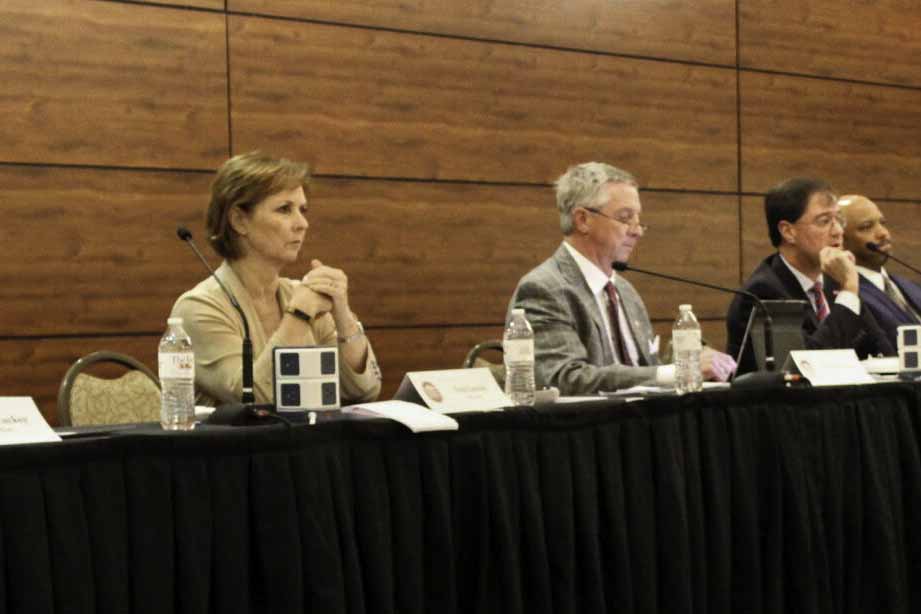The Board of Trustees of Institutions of Higher Learning held their second in-person listening session on Thursday to gain input from different groups in the UM community in their search for the next chancellor. The IHL held the first listening session in June at the University of Mississippi Medical Center.
Each session was divided into sections to address specific constituencies.
No students attended the first listening session in June. Thursday’s session had a large turnout of students who voiced their opinions on the chancellor search as well as the recent issues concerning racism on campus.

One student, senior public policy leadership major R.G. Pickering, listed three qualities he thought the board should consider in their search. He said the next chancellor should be connected to the ‘soul of Ole Miss,’ have a diverse background and be an effective communicator.
“It is important to have a chancellor that understands the university and who communicates exceptionally with students and stakeholders,” Pickering said.
Several students said they did not think the next chancellor should prioritize issues involving race on campus, and others said that moving the confederate monument should be paramount in the new chancellor’s mind.
“It’s not about erasing history,” senior political science major Sergio Brack said. “It’s about understanding that some history doesn’t need to be put on a pedestal.”
Douglass Sullivan-González, dean of the honors college, encouraged the IHL board to keep their search simple and compared recent chancellor hires to former Chicago Cubs player Bill Buckner’s tenth inning error in the 1986 World Series.
“If he had stuck to the fundamentals, the curse would have been lifted, but instead the curse remained in the 21st century,” Sullivan-Gonzalez said.
Some members of the community voiced their frustration that the IHL was not providing feedback during the listening session.
Ford Dye, vice president of the IHL board and chair of the Chancellor’s Search Advisory Committee, said that the listening session was set up for the IHL to hear the concerns of the public so that the IHL can use them for input in their interviews of candidates. Dye also said that there would not be a time for the public to receive feedback during the session.
At the previous listening session in June, several members of the IHL did answer questions from the crowd. Provost Noel Wilkin, who was in attendance at the session in June, also answered questions about the university’s efforts to recruit students from Mississippi.
Sociology professor James Thomas, who was recently granted tenure by the IHL after a controversial tweet, expressed his frustration with the lack of feedback several times during the session.

Thomas asked that the IHL board for a definition of “academic freedom” and asked that the board keep the standards of academic freedom in mind in their search for candidates. He was frustrated when the board would not respond to any questions. Several other faculty members from the history and sociology departments also said that academic freedom should be a priority for the new chancellor.
“Having been to several sessions now, I’m not convinced that this is the best way to convince campus publics and get the best information for the search,” Thomas said. “It feels coming before the microphone, like you’re coming before a court.”
Barron Mayfield, Associated Student Body president and member of the Chancellor Search Advisory Committee, said that the listening session would be helpful for him when trying to flesh out candidates for nomination but might leave the community frustrated.
“I don’t know if it’s the most effective way in terms of connecting with the community,” Mayfield said. “You’re going to get helpful information and good feedback … but I don’t think it makes the community feel super involved in the process. That’s been frustrating, but I do think it will be helpful in the end.”
The IHL is also holding an online listening session for students, faculty and staff and alumni to voice their concerns. The online listening session closes on September 6.
The first round of interviews will begin on Oct. 2. There will be a second round of interviews mid-October and the IHL hopes to have a candidate in place by the end of the month.
One alumnus asked the board what they would do, if after finishing the search process, they still could not agree upon a candidate.
Dye said they would “cross that bridge when they get to it.”














